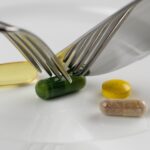 A recent study investigated whether there was a link between supplement usage and a reduced risk of contracting COVID-19. Good news! Being proactive about your health and nutrition reduces your risk of infection with SARS-CoV-2.
A recent study investigated whether there was a link between supplement usage and a reduced risk of contracting COVID-19. Good news! Being proactive about your health and nutrition reduces your risk of infection with SARS-CoV-2.
Users of the COVID-19 Symptom Study app (who regularly took common dietary supplements) were less likely to test positive for SARS-CoV-2 infection. The COVID-19 Symptom Study app was developed by health data company Zoe Global which was co founded by Tim Spector, a British epidemiologist and science writer. In women there was a positive association between probiotic use, omega-3 fatty acids, a multivitamin or vitamin D and testing negative for SARS-CoV-2.
Interestingly, only in certain subsets and certain countries was this noted for men. To give one example – men aged 40–60 years taking omega-3 fatty acids were less likely to be infected.
More effective in females?
There are several hypotheses as to why the effects of supplements may appear stronger in women. Females may possess a more resilient immune system than males with higher numbers of circulating B cells when matched for age. There may also be considerations with regards differences in body composition between males and females meaning that supplement dosing may actually be higher in females. It may be practical aspects like women perhaps being generally more precautionary around mask wearing outside and engaging in more hand washing and social distancing.
Vitamin C, zinc and garlic for SARS-CoV-2
There was no effect of common immune supporting nutrients, vitamin C, garlic and zinc. However, zinc and vitamin C are often proposed to support the immune system and to prevent respiratory infections. It may be that vitamin C and zinc are more effective in the acute stage of an infection and support a reduction in severity and symptom duration.
A review of 12 studies, including five randomised controlled trials, published in the journal Life, found that vitamin C may be an effective treatment for SARS-CoV-2. Of course, these were high dose therapeutic amounts administered intravenously in a clinical setting.
Get bespoke advice
It is reasonable to assume that people with a healthier diet were more likely to take supplements. But the effect of the supplements outlined in the COVID-19 Symptom Study was independent from the effect of diet quality and potential healthy user bias was considered.
Broad spectrum probiotics, omega-3, multivitamins and moderate doses of vitamin D are generally safe for most people. However, we do advise obtaining personal advice when it comes to starting a supplement routine, particularly if you have any health conditions or are taking medications.
Probiotic use – food sources
Firstly, to support gut health , eating plenty of plant foods to nourish your microbes is a great way to start. Secondly, enjoying some fermented foods (cautiously if you suspect gut or histamine issues) may also support microbial diversity.
Omega-3 – food sources
For omega-3, think SMASH fish– salmon, mackerel, anchovies, sardines and herring. Consuming these fish 3 times a week would bring you quite close to what you might obtain from an omega 3 supplement. Try this Teriyaki salmon recipe to start you off.
Vitamins and minerals – food sources
You need to consume a variety of foods in order to obtain a variety of vitamins and minerals. Are you stuck in a rut of buying the same things over and over again? This week challenge yourself to make one new recipe or buy one new fruit or veg you have never tried.
Vitamin D
Vitamin D we say ‘test don’t guess’ – it is easy to over / under supplement here.
You can use this link to order an at home test from LetsGetChecked. Use the code ‘GLENVILLE’ to obtain a 30% discount. We can use these results to give you specific advice around whether to supplement, and at what dose.
If you would like more information about the services we offer, including testing, please get in touch.
References:
Louca, P., Murray, B., Klaser, K., Graham, M. S., Mazidi, M., Leeming, E. R., Thompson, E., Bowyer, R., drew, D. A., Nguyen, L. H., Merino, J., Gomez, M., Mompeo, O., Costeira, R., Sudre, C. H., Gibson, R., Steves, C. J., Wolf, J., Franks, P. W., Ourselin, S., … Menni, C. (2021). Modest effects of dietary supplements during the COVID-19 pandemic: insights from 445 850 users of the COVID-19 Symptom Study app. BMJ nutrition, prevention & health, 4(1), 149–157. https://doi.org/10.1136/bmjnph-2021-000250
Holford, P., Carr, A. C., Zawari, M., & Vizcaychipi, M. P. (2021). Vitamin C Intervention for Critical COVID-19: A Pragmatic Review of the Current Level of Evidence. Life (Basel, Switzerland), 11(11), 1166. https://doi.org/10.3390/life11111166

